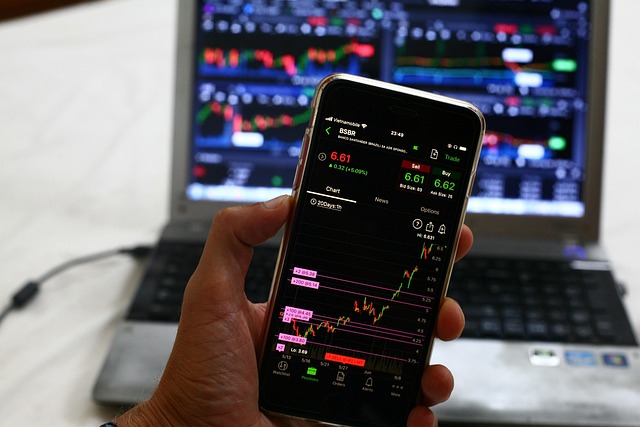Which Trading App Is Legitimate and Safe in India: An In-Depth Guide
Author: Jameson Richman Expert
Published On: 2025-09-08
Prepared by Jameson Richman and our team of experts with over a decade of experience in cryptocurrency and digital asset analysis. Learn more about us.
In today's rapidly evolving financial landscape, the proliferation of trading platforms—ranging from traditional stock brokers to emerging cryptocurrency exchanges—presents a wealth of opportunities alongside significant risks for Indian investors. The key challenge lies in discerning legitimate, regulated platforms from illegitimate or fraudulent schemes that can jeopardize your funds and personal data. As India continues to refine its stance on digital assets, derivatives, and online trading, understanding which apps are genuinely trustworthy, compliant with Indian laws, and equipped with robust security features has become essential. This comprehensive guide explores critical criteria for evaluating credible trading platforms, reviews the most reputable apps available to Indian traders, and provides detailed insights into the legal and regulatory landscape, empowering you to make informed, safe, and profitable trading decisions.

Why Choosing a Legitimate Trading App Matters in India
Investing through a licensed and regulated trading platform offers numerous benefits, including enhanced security, legal protection, and adherence to fair trading practices. The Securities and Exchange Board of India (SEBI) is the primary regulator overseeing stock exchanges, derivatives markets, and related entities, ensuring investor protection, transparency, and market integrity. A SEBI-registered broker must comply with strict operational and compliance standards such as maintaining segregated client accounts, adhering to anti-money laundering (AML) protocols, and providing transparent fee structures. These safeguards significantly reduce the risk of fraudulent activities, unauthorized access, or asset misappropriation.
In contrast, the cryptocurrency segment remains in a regulatory grey zone. The Reserve Bank of India (RBI) had imposed banking restrictions on dealing with crypto exchanges in 2018, which the Supreme Court nullified in 2020, restoring some operational freedoms. However, the legal framework remains uncertain, with ongoing legislative discussions about banning or regulating digital assets. Several unregulated platforms have emerged with questionable compliance and security standards, often risking investor funds. Therefore, Indian traders must prioritize platforms that are either SEBI-registered or operated by established international entities with transparent policies, rigorous security protocols, and compliance with applicable laws.
How to Identify a Trustworthy Trading App in India
- Regulatory Authorization: Verify whether the platform holds valid licenses from Indian regulators like SEBI, or international authorities such as the Financial Conduct Authority (FCA) in the UK, or the Cyprus Securities and Exchange Commission (CySEC). For cryptocurrency exchanges, scrutinize their adherence to local guidelines and whether they operate under recognized jurisdictions with transparent compliance policies.
- Security Infrastructure: Evaluate the platform’s security measures, including two-factor authentication (2FA), biometric login options, SSL encryption, multi-signature wallets, and regular third-party security audits. Platforms employing cold storage solutions for cryptocurrencies significantly reduce hacking risks, while real-time transaction monitoring helps detect suspicious activities.
- Operational Transparency: Trustworthy platforms disclose clear fee structures, detailed terms of service, privacy policies, and have accessible customer support channels. Avoid apps with ambiguous fee disclosures, hidden charges, or opaque operational procedures, as these may indicate fraudulent intent.
- User Feedback & Reputation: Conduct independent research by exploring platform reviews on forums, social media, and trusted rating sites like Trustpilot. Consistent positive feedback regarding deposits, withdrawals, and customer support, combined with minimal recurring complaints, indicates reliability. Be cautious of platforms with frequent withdrawal issues or poor customer service.
- Ease of Use & Support for INR Transactions: User-friendly interfaces, local language support, and seamless Indian Rupee (INR) deposit and withdrawal processes enhance usability, especially for beginners and retail traders unfamiliar with international trading norms. Platforms offering integrated INR wallets reduce currency conversion hassles and additional charges.
In-Depth Review of Top Reliable Trading Apps in India
Binance: The Global Cryptocurrency Powerhouse
Binance is one of the world's largest and most liquid cryptocurrency exchanges, renowned for its vast array of supported cryptocurrencies, derivatives, and advanced trading features like futures, options, and staking. While Binance is not directly licensed by Indian regulators, it operates via international licenses and has adapted to serve Indian traders by enabling INR deposits through third-party payment gateways and local banking partnerships. Its robust security infrastructure includes multi-tier security architecture, cold wallets for asset storage, real-time monitoring systems, and multi-signature protocols that collectively aim to safeguard user funds against hacking threats.
Despite its international stature, Binance's legal standing in India remains somewhat ambiguous, with ongoing regulatory discussions about its operations. Indian traders should stay informed about potential regulatory shifts, as new laws could impact platform functionality or impose additional compliance requirements. Importantly, all crypto gains are taxable under Indian law; traders must declare profits and losses accurately in their income tax returns. To ensure safety, always register via the official Binance link: Register at Binance and verify the URL to prevent phishing scams.
MEXC Global: Comprehensive Asset Offerings for Indian Traders
MEXC has gained popularity among Indian traders for its broad asset spectrum, including spot trading, derivatives, staking options, and token launchpads. The platform accepts INR deposits through verified third-party payment processors, making it accessible and convenient for retail investors. MEXC emphasizes security with encrypted data transmission, cold storage solutions, and periodic security audits to safeguard user assets. Its intuitive interface, competitive fee structure, and rich educational resources make it particularly suitable for beginners venturing into crypto markets.
Furthermore, MEXC's active community engagement and referral programs foster a collaborative trading environment. Always access the platform via verified links such as here to avoid scams. Conduct due diligence before depositing funds or executing trades.
Bitget: Derivatives & Copy Trading for Advanced Traders
Bitget specializes in derivatives trading, providing futures, perpetual swaps, and leveraged products tailored for experienced traders in India. Its high-speed order execution, strong security infrastructure—including biometric authentication, cold wallets, and real-time monitoring—supports safe and efficient trading. Additionally, Bitget’s innovative copy trading feature allows users to replicate successful traders’ strategies, lowering entry barriers for those new to derivatives trading but willing to take calculated risks.
Given the high risk associated with derivatives, traders should approach leverage and margin trading cautiously, understanding both their risk appetite and tax implications under Indian law. Registration is available via verified links such as here. Always verify the authenticity of the URL to avoid phishing scams.
Bybit: Focused on Perpetual Contracts & User Education
Bybit has established itself as a leading derivatives platform specializing in perpetual contracts with high leverage options. It offers rapid order execution, an intuitive interface, multi-layer security protocols—including multi-signature wallets, cold storage, and routine security audits—and a strong emphasis on trader education through webinars, tutorials, and blogs. Bybit’s educational initiatives empower traders of all skill levels to grasp complex trading concepts and make informed decisions.
While Bybit is compliant with international standards, Indian traders should remain aware of tax obligations related to derivatives, including reporting gains and potential liabilities. Registration should be done through the official link: here. Always verify website URLs to prevent scams.

Crucial Factors When Selecting a Trading Platform in India
- Regulatory Status: Confirm whether the platform is SEBI-registered for equities and derivatives or complies with recognized international licensing standards for cryptocurrencies. Licenses and regulatory oversight provide legal safeguards and dispute resolution mechanisms.
- Security & Data Privacy: Prioritize platforms employing the latest security practices such as two-factor authentication, biometric options, SSL encryption, cold storage for cryptocurrencies, and regular third-party security audits. These measures help prevent hacking, data breaches, and unauthorized access.
- Market & Asset Variety: Trustworthy apps should offer a wide range of tradable assets—stocks, derivatives, commodities, cryptocurrencies—with access to real-time data and sufficient liquidity to execute trades efficiently.
- Fee Transparency: Clear disclosure of all applicable fees—trading, withdrawal, deposit, conversion, and others—prevents surprises and preserves your profit margins. Avoid platforms with complex fee structures or ambiguous disclosures.
- Customer Support & Localisation: Responsive, multilingual customer support, local language interfaces, and seamless INR deposit/withdrawal options significantly enhance user experience, particularly for retail investors unfamiliar with international platforms.
Regulatory Framework & Legal Aspects of Trading in India
India's regulatory environment regarding trading, especially in digital assets, continues to evolve. The RBI initially imposed restrictions on banks dealing with crypto exchanges in 2018, which were subsequently overturned by the Supreme Court in 2020. Nonetheless, the government is actively reviewing policies around cryptocurrencies, with proposed bills that could regulate, tax, or potentially ban certain digital assets. SEBI is also exploring regulation of security tokens and Initial Coin Offerings (ICOs), which could pave the way for more legitimacy and investor protection in the digital asset space.
As a trader, staying updated with official notifications from RBI, SEBI, and the Ministry of Finance is critical. Avoid unlicensed platforms operating without proper regulatory oversight, as they pose legal and financial risks, including potential asset loss and legal action. Ensuring your chosen platform complies with current laws is fundamental to safeguarding your investments.
Final Thoughts
Navigating India’s complex trading ecosystem requires vigilance, thorough research, and continuous awareness of regulatory developments. While globally recognized platforms like Binance, MEXC, Bitget, and Bybit offer advanced features and robust security protocols, Indian traders must diligently verify their regulatory status and adopt best practices to protect their assets. Prioritize platforms with proper licenses, transparent fee structures, and top-tier security measures to ensure long-term success.
Remaining informed about legal updates, practicing secure login habits, and consulting official sources such as government notifications, SEBI guidelines, and reputable financial advisories will help you maintain a safe trading environment. Remember, responsible and educated trading is the foundation for generating sustainable wealth in both traditional and digital markets. Make well-informed decisions, trade responsibly, and set yourself on a path toward financial growth and security in India’s dynamic trading landscape.